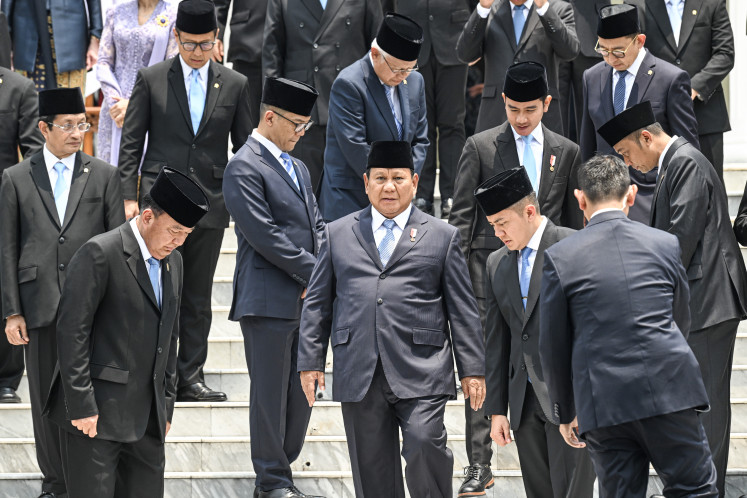Popular Reads
Top Results
Can't find what you're looking for?
View all search resultsPopular Reads
Top Results
Can't find what you're looking for?
View all search resultsViolence rampant in RI’s schools
A viral video showing a vocational school teacher slapping his students in Purwokerto, Banyumas regency, Central Java, has highlighted a classroom environment where violence is pervasive
Change text size
Gift Premium Articles
to Anyone
A
viral video showing a vocational school teacher slapping his students in Purwokerto, Banyumas regency, Central Java, has highlighted a classroom environment where violence is pervasive.
Although efforts to curb school violence have made some progress, violent acts at the hands of teachers or other students are prevalent, hampering education in the country.
Lukman Septiadi, 27, an information technology teacher at SMK Kesatrian vocational school, Purwokerto, was reported to the police after a video, which showed him slapping his students’ faces, went viral on social media.
The incident began when Lukman wanted to punish a number of students that he accused of truancy on Thursday.
Two scenes, which showed Lukman slapping his students, had apparently been recorded secretly on a mobile phone by a student, who later uploaded it on social media.
In the video footage, Lukman was seen to caress the cheek of a student before giving him a strong slap.
A loud noise can be clearly heard in the less-than-one-minute video. The student was seen staggering because of the strong slap.
The video drew attention within minutes of it being posted on a social media site.
Shortly after the first video went viral, Lukman posted his own video on social media through which he clarified his version of the incident.
“Yes, it’s me. It was me that hit all of these students. Here, you can see all of the victims,” he said, appearing not to show any remorse.
“I know, I understand what I have done. I did all of this with a purpose. I didn’t do it for nothing. I didn’t do it without a purpose,” he went on.
But this did not put an end to the matter as a number of parents and journalists went to the school to demand an explanation about the video, causing school officials to panic.
The officials later escorted their colleague to the Banyumas Police station to avoid escalating the situation.
Concurrently, parents of the students filed a report with the Banyumas Police, who later named Lukman a suspect.
During his interrogation, Lukman claimed he intentionally hit the students for truancy and poor discipline.
Nine students suffered physical punishment, the police said.
Lukman has been charged with child abuse and is subject to a maximum punishment of 3.5 years’ imprisonment as stipulated in Article 80 of the 2002 Child Protection Law.
This kind of incident in a school is just the tip of the iceberg as it was not the first time for such violence to occur.
In 2016, a teacher in Bantaeng, North Sulawesi, reacted violently to one of her students as the latter was playing in the school’s prayer room when the teacher was about to observe the noon prayer.
In November 2017, a video of a teacher in Pangkalpinang, Bangka Belitung, repeatedly beating his student went viral on the internet.
The Education and Culture Ministry’s head of communication and public service Ari Santoso condemned the violence, citing it as unlawful and unjustifiable.
“The ministry had issued a regulation that forbids any kind of violence in schools,” Ari said in a written statement received by The Jakarta Post on Sunday.
He is referring to the Education and Culture Ministerial Regulation No. 82/2015 on the prevention of violence in schools.
Anna Surti Ariani, a child psychologist from the University of Indonesia’s school of psychology, said the impact of violence differed for each person.
“It doesn’t always have negative effects on the victim. It [the incident] could serve as a great life lesson for them. For example, they will be able to learn how to treat people better than their teacher treats them,” Anna told The Jakarta Post on Sunday.
“To comfort victims who experience trauma because of violence, parents can play a key role in reassuring their children. Give them [the children] a chance to tell their stories, but don’t force them to do so,” Anna said.
A researcher from the Educational Research Center Iwan Syahril said some teachers might have grown up in an era where corporeal punishment was justifiable, which influences their methods of disciplining students.
“Some teachers may also lack the knowledge on how to make their students behave without resorting to coercive measures.” (dpk)










